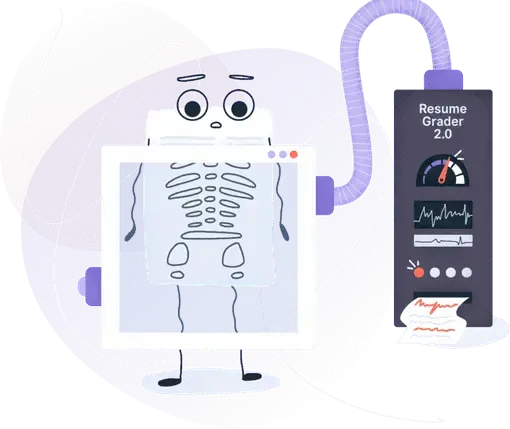C++ Skills: Example Usage on Resumes, Skill Set & Top Keywords in 2025
Listing C++ as a skill on your resume indicates to recruiters your ability to solve complex problems and a strong foundation in programming. Dive into the guide below for inspiration on crafting an effective resume that showcases your capabilities in different areas.


Is your resume ATS-friendly?
Drop your resume here or upload a file to find out if the skills in your resume are readable by an ATS.
C++ is a programming language that is widely used for creating computer software, games, and in systems programming due to its high performance and control over system resources. Adding C++ to your resume indicates to employers that you have skills in software development, an understanding of low-level programming concepts, and the ability to write efficient code. This skill is valued in industries where performance and resource optimization are crucial, like finance, gaming, and tech industries, where software needs to run quickly and effectively.
However, simply listing "C++" on your resume without context or additional information can be somewhat limiting. It may not capture the depth of your expertise, or suggest that you are up-to-date with modern programming practices. Additionally, if you're applying for roles that don't require C++ or prioritize other languages and technologies, it may be more beneficial to highlight those relevant skills or emphasize your adaptability in learning new programming languages. A better approach might be to specify your experience level, relevant projects, and the results you've achieved with C++, making your resume more dynamic and engaging.
In this article, you will learn:
- How incorporating C++ in your resume can increase job opportunities in certain fields.
- The potential limitations of featuring C++ as a standalone skill and tips to provide context.
- Ways to present your C++ skill to appeal to a broader range of employers.
Misusage of c++ on resumes
C++ is a powerful programming language that has the potential to enhance your resume if presented correctly. However, overstatement of your C++ skills or misrepresentation of your experience can damage your credibility and reduce your chances of landing a job. It's crucial to accurately reflect your familiarity and projects involving C++, as any false information can be easily exposed during technical interviews or on-the-job performance.
Examples of misusing C++ skill on your resume:
- In the summary section, an inaccurate statement like "Expert in C++ with extensive experience in all aspects of software development" can be misleading if you've only taken a basic course or handled a few simple tasks.
- In the experience section, listing "Led a complex C++ project to successful completion" when you only played a minor role can come across as dishonest to potential employers.
- In the achievements section, stating "Increased company performance tenfold through an innovative C++ algorithm" could be seen as an exaggeration if the improvement was not solely attributable to your work or if the algorithm was not originally developed by you.
How to demonstrate c++ skills on your resume
- List your experience with C++ projects, including specific tasks you were responsible for and the outcomes of these projects.
- Include any relevant coursework or certifications that show your knowledge of C++ and object-oriented programming principles.
- Discuss any contributions you’ve made to open-source C++ projects or forums, which can demonstrate your practical skills and involvement in the community.
- Mention specific C++ tools and technologies you’re proficient in, such as Qt, Boost, or CMake, to show your familiarity with the ecosystem.
- Highlight problem-solving scenarios where your C++ skills led to effective solutions, illustrating your ability to apply your knowledge.
Example 1: Demonstrate c++ in the experience section
- •Developed a high-performance data processing application in C++ that handles over 100 million requests daily, significantly improving system efficiency.
- •Led a team of 5 programmers in creating a C++ based machine learning algorithm, increasing prediction accuracy by 15% over previous iterations.
- •Contributed to the architecture of a multi-threaded C++ service, which reduced process times by 40% and handled twice the load without additional hardware investments.
- •Successfully integrated complex C++ modules into existing systems, ensuring seamless data exchange and compatibility across platforms.
- •Implemented an automated testing and deployment pipeline for C++ applications that decreased release cycles by 30%, allowing for more frequent updates and enhancements.
- •Optimized and refactored legacy C++ code for Microsoft Office Suite resulting in a 25% performance increase and reduced memory usage.
- •Collaborated across teams to define and implement C++ coding standards which enhanced code quality and maintainability for future projects.
- •Participated in the design and implementation of new C++ features for the Windows operating system, improving overall system stability and user satisfaction.
- •Directed and contributed to the C++ development of several AAA game titles which consistently surpassed sales targets by over 20%.
- •Established a C++ centric streamlined workflow that facilitated the collaboration between programmers and artists, shortening production times by 10%.
- •Implemented a series of advanced C++ rendering techniques that enhanced game visual fidelity and performance on next-gen consoles.
To create a resume like this, consider the following guidelines:
- Lead with a clear job title that showcases your role.
- Choose reputable companies that are recognized in the industry.
- For each role, provide concrete examples of projects and their results.
- Use quantifiable achievements to demonstrate your impact.
- Focus on various types of work situations to show versatility.
- Limit the use of overused phrases and focus on meaningful content.
- Make every bullet point count by linking it to business goals and outcomes.
- Write in a direct, approachable style, as if speaking to the reader.
- Keep language simple and accessible to a wide audience.
Remember, a good resume effectively communicates your skills and contributions without resorting to cliches or jargon. It should give a potential employer a clear, concise understanding of why you're the ideal candidate for the job, backed by specific examples and achievements.
Example 2: Demonstrate c++ in the summary section
- It clearly denotes over a decade of expertise in a relevant field, establishing the applicant as highly experienced.
- The summary emphasizes the applicant's skill in C++, aligning with the job's technical requirements.
- There is a concrete example of the applicant's impact through their involvement in a successful project.
- The language reflects a strong work ethic and a proactive approach to professional challenges, valuable in any role.
- By focusing on the ability to solve problems and contribute to project success, the summary communicates the applicant's potential value to future projects.
Example 3: Demonstrate c++ in the achievements section
- The achievements are specific and show measurable outcomes, like improved performance and reduced load times.
- By avoiding the use of broad language, the descriptions stay on point and clearly communicate the impact of the work done.
- Each entry focuses on the result of the applicant’s action, rather than simply listing tasks, which allows for a better understanding of their skills in practical situations.
- The use of actual numeric results demonstrates the tangible benefits the applicant brought to previous positions.
- The language is simple, clear, and to the point without relying on industry jargon, making the information accessible for all readers.
What are the relevant certifications for c++ skills on resume
If you're aiming to demonstrate your proficiency in C++, the following certifications can be strong additions to your resume:
The top 5 certifications for gaining c++ skills expertise:
Top skills people add together with c++ skill on resume:
Java
Python
C#
Object-Oriented Programming (OOP)
Software Development
Algorithms
Data Structures
SQL
Linux
Git
Problem-Solving
Critical Thinking
Teamwork
Communication
Adaptability
Time Management
Creativity
Attention to Detail
Leadership
Proactivity
Continuous Learning
Most relevant jobs for c++ skills
C++ is a versatile programming language widely recognized in various technical fields. Proficiency in this language can lead to careers in software development, gaming, and finance, to name a few. If you’re eager to put your C++ expertise to work, consider these common job roles that actively seek your skill set.
- Software developer – You’ll create software applications and systems.
- Game developer – You’ll build engaging video games.
- Embedded systems engineer – You’ll develop software for non-PC devices, like cars or appliances.
- Quantitative analyst – You’ll focus on financial models and algorithms.
- Backend developer – You’ll work on the server-side of web applications.
- Systems architect – You’ll design complex software infrastructure.
- Graphics developer – You’ll focus on visual effects and simulations.
- Robotics engineer – You’ll program the robots of tomorrow.
- Algorithm engineer – You’ll optimize and develop algorithms solving specific problems.
- Software quality assurance engineer – You’ll test and debug software for quality.
Key takeaways
- Adding C++ to your resume can demonstrate valuable programming skills to potential employers.
- Avoid misusing C++ skills by understanding best practices and applying them correctly in your work.
- Showcase your C++ expertise on your resume through specific project examples and results achieved.
Make one that's truly you.




